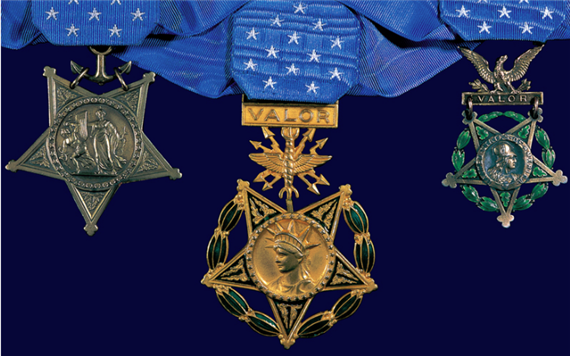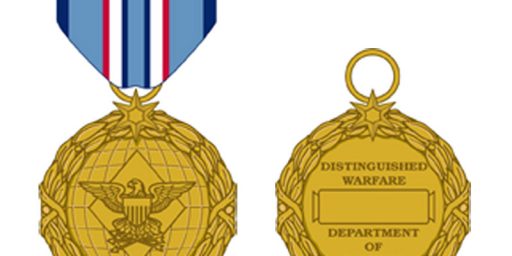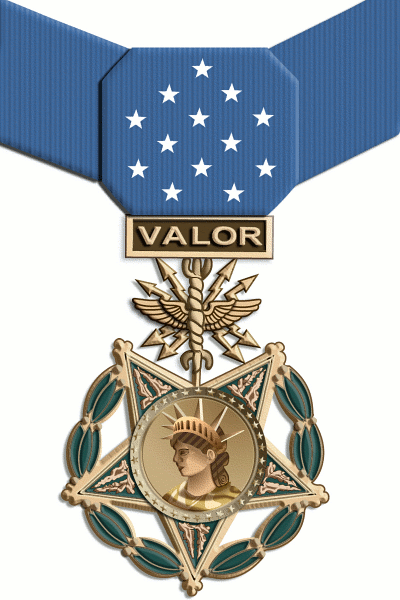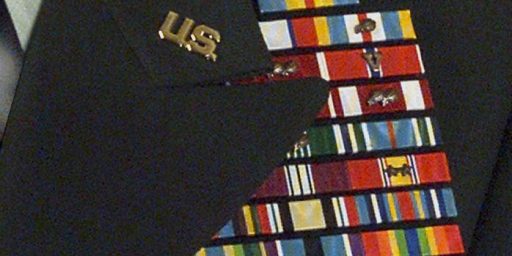Medal of Honor Rarity
Via Glenn Reynolds, I see that NRO’s David French revives a meme I’ve noted before over the past several years in a posting titled “Why So Few Medals of Honor?“ It in turn references Katherine Zeopf‘s NYT Magazine piece “What Happened to Valor?” and, in particular, this passage:
Despite its symbolic importance and educational role in military culture, the Medal of Honor has been awarded only six times for service in Iraq or Afghanistan. By contrast, 464 Medals of Honor were awarded for service during World War II, 133 during the Korean War and 246 during the Vietnam War. “From World War I through Vietnam,” The Army Times claimed in April 2009, “the rate of Medal of Honor recipients per 100,000 service members stayed between 2.3 (Korea) and 2.9 (World War II). But since the terrorist attacks of Sept. 11, 2001, only five Medals of Honor have been awarded, a rate of 0.1 per 100,000 — one in a million.”
Since that article was published, President Obama, on Sept. 17, presented the sixth post-9/11 Medal of Honor to the family of Army Sgt. First Class Jared C. Monti for his heroic efforts, under intense enemy fire, to rescue a wounded fellow soldier in Afghanistan in 2006. Monti died in the attempt. In fact, all six medals since 9/11 have been awarded posthumously. For service during World War II and the Vietnam War, by comparison, roughly 60 percent of all Medals of Honor were awarded posthumously.
The steep decline in the awarding of Medals of Honor — along with the absence, post-9/11, of any Medal of Honor bestowed on a living serviceman — has spurred many military officers and veterans to speak out in protest. These servicemen complain that higher-ups at the Pentagon either downgrade valor-award nominations — as with Peralta’s Navy Cross — or reject them altogether.
I’ve written about the phenomenon at least twice before: “Medal of Honor Even Rarer in Modern War” (Dec. 2005) and “Medal of Honor a Posthumous Award Only?” (July 2009). The explanations offered then still strike me as plausible: The footprint of the Iraq and Afghanistan wars is much smaller than that of Vietnam or WWII and,whereas those wars were characterized by constant fighting, the current ones are of a more amorphous nature.
Another possibility occurs to me now: These wars are being fought entirely by professional soldiers whereas the others were manned predominately by draftees and short-timers. It may simply be that “above the call of duty” is a higher standard among professional warfighters than among those who rally to the flag during wartime.
I recall during Desert Storm reading of infantry soldiers getting awarded the Silver Star for taking out a machine gun nest with a hand grenade. For farm boys from Iowa called up by Uncle Sam to fight the Viet Cong, that would have been a pretty extraordinary accomplishment. But my reaction at the time was that every single private in the Army is taught how to do that during Basic Training. It’s simply an infantryman’s job, not some act of inordinate heroism, to do that.







I suspect it’s because a lot fewer servicemen are dying. Correct me if I’m wrong, but it’s always been my impression that guys who died in the line of duty are a significant majority of MOH winners.
According to the article cited above, “For service during World War II and the Vietnam War, by comparison, roughly 60 percent of all Medals of Honor were awarded posthumously.” But, for post-9/11 conflicts, it’s been 100 percent.
That would seem to partially support my theory. Fewer guys dying, and they’re just not giving them to anyone who doesn’t, equals a lot fewer awards.
As it has been since it was created during the Civil War, the purpose of the Medal of Honor is to buck up morale. My guess would be that the Congress isn’t concerned about morale for whatever reason.